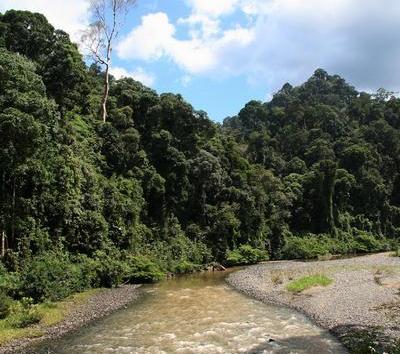Despite financial chaos, donors pledge $100M for rainforest conservation
mongabay.com, October 23, 2008
Donors meeting this week in Washington D.C. pledged more than $100 million to the World Bank's new initiative for conserving tropical forests.
In addition to the $100 million in donations, the World Bank announced that more than forty developing countries have asked to join the Forest Carbon Partnership Facility — the Bank's foray into the emerging market for forest carbon credits. 25 countries have so far been selected to participate in the initiative, which builds capacity for countries to earn compensation through the carbon markets for reducing greenhouse gas emissions by reducing deforestation and forest degradation (REDD). Experts say the mechanism could eventually lead to the transfer of billions of dollars per year to fund conservation and rural development in tropical countries, while at the same time helping fight climate change. Deforestation and land use change presently accounts for around a fifth of anthropogenic emissions.
The developing countries accepted into the facility include 10 in Africa (Cameroon, the Democratic Republic of Congo, Ethiopia, Gabon, Ghana, Kenya, Liberia, Madagascar, Republic of Congo and Uganda); 10 in Latin America (Argentina, Bolivia, Colombia, Costa Rica, Guyana, Mexico, Nicaragua, Panama, Paraguay and Peru); and five in Asia and the South Pacific (Lao PDR, Nepal, Papua New Guinea, Vanuatu and Vietnam).
"The Congo Basin countries consider the FCPF as an opportunity to validate reducing forest degradation as a climate change mitigation instrument. With the FCPF, forests will find their true role as carbon pools and providers of social and economic well-being," said Etienne Massard K. Makaga, Directeur general de l'Environnement du Gabon, and Climate Focal Point and one of the REDD country participants in the FCPF. He added, "The FCPF is not a solution in and of itself. It must remain a structuring tool that will allow us to achieve the objectives of reducing emissions from deforestation and forest degradation."
The World Bank also announced the election of the FCPF Participants Committee, a group consisting of 10 donor and carbon fund participants and 10 developing country participants. The committee's first decision was to establish a small grants program for forest-dependent indigenous peoples and other forest dwellers to benefit from REDD via the FCPF. The decision — though initially funded with a paltry $1 million — seeks to address the criticism that the REDD process doesn't involve indigenous people, a charge that has been a major stumbling block in negotiations to date.
The governing panel of the partnership includes nineteen countries — Australia, Bolivia, Costa Rica, Democratic Republic of Congo, France, Gabon, Germany, Ghana, Guyana, Japan, Kenya, Madagascar, the Netherlands, Norway, Panama, Switzerland, the United Kingdom, the United States and Vietnam — and one NGO, The Nature Conservancy (TNC), which donated $5 million.
"It is heartening to know that despite the current financial situation, countries around the world understand that we cannot delay action on battling climate change," said Mark Tercek, president and CEO of The Nature Conservancy. "Forest protection is one of the most cost-effective methods available to fight climate change. If we don't take action now, climate change ultimately will have a much greater impact on the global economy and the natural resources we all depend upon for survival."
"Right now, developing countries can generate more money from cutting down their forests than from keeping them standing," Tercek continued. "The Forest Carbon Partnership Facility will bring developed and industrialized countries together - along with forest communities, indigenous groups, the private sector and civil society - to establish a financial value for the carbon stored in standing forests."
The FCPF expects to raise more funds from governments, NGOs, and the private sector in coming months. Participants in the meeting said they are encouraged by the progress to date.
"It is very encouraging to note the enthusiasm for REDD among such a large number of developing countries," said Deputy Director Per Pharo of the Government of Norway's International Climate and Forest Initiative. "Especially in light of the close cooperation being established between the World Bank and the UN REDD Program, we are very happy with how this is evolving. It is essential that REDD countries remain in the driver's seat, and that all stakeholders are involved going forward."
"I am impressed by the level of interest expressed in the FCPF by developing countries," said Katherine Sierra, Vice President, Sustainable Development, the World Bank. "We thought 20 would be a reasonable target, but more than 40 countries have said they were interested. Countries are investing considerable time and resources to prepare themselves for REDD, and they should be commended for taking these steps."












No comments:
Post a Comment